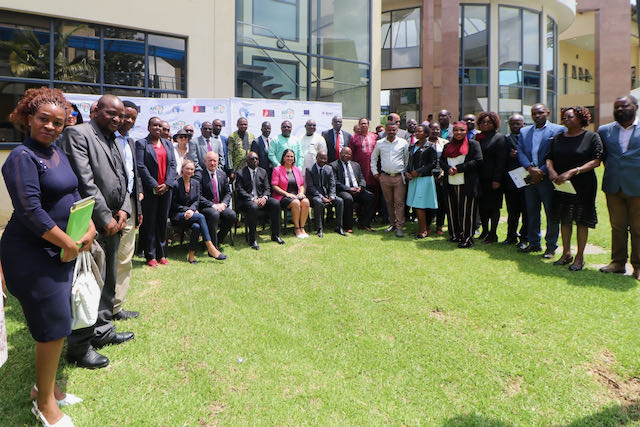The African Regional Intellectual Property Organization (ARIPO) hosted the European Patent Office President (EPO), Mr. António Campinos, at the official opening of the Patent Libraries (PATLIB) seminar on “IP awareness sessions on patents and innovation for Africa” from the 6th to 7th of December 2022, organised within the framework of the Reinforced Partnership between ARIPO & EPO with support from the Intellectual Property Rights and Innovation in Africa (AfrIPI).
The EPO President stressed the role and importance of the network in supporting African universities on the path to knowledge transfer and stated that the Knowledge Transfer 2 Africa initiative (KT2A) was in place to foster cooperation between our PATLIB network and more than 60 universities spanning the continent.
He noted that EPO wanted to lay the groundwork for exploring skills in patent knowledge, technology transfer and patent commercialisation capabilities.
The PATLIB intervention aligns with ARIPO’s continuous mandate to build Intellectual Property (IP) capacity toward Africa’s socio-economic development. This seminar is contained in the Biennial Work Plan 2022-2024 & delivered as part of the Knowledge Transfer to Africa project.
The ARIPO Director General was hopeful that beyond the pilot, which was anticipated to be a success judging from its promise, impact, and current momentum, ARIPO aimed to enrol all interested universities in the region to allow them access to IP knowledge and information on converting IP rights into market products.
“The fact that over 40% of these PATLIB centers are based in academic environments is already a benefit for our universities because, from where we stand, national governments are beginning to demand a lot from the institutions in terms of knowledge production,” noted ARIPO’s Director General.
The project is tailored for ARIPO Member States’ universities. The pilot universities will have access to the well-established network of more than 320 PATLIB centers in Europe that have IP knowledge & information on how to convert IP rights into market products.
“The role of universities and learning institutions has evolved beyond just imparting knowledge to students. In the knowledge economy in which these institutions now operate, there was a greater need to harness information, promote innovation and create innovation value chains that contribute towards the sustainable development of communities and national economies,” noted Mr Twebaze
“As leaders in the IP arena, It is high time we addressed the lacklustre performance of Africa in the global industrial property statistics. More IP applications mean more sustainable agriculture and food security, improved medicines, therapeutics and diagnostics, clean water & general socio-economic progress,” he added.
The two-day seminar aimed to promote awareness of the importance of IP to universities, research and development institutions, and innovation associations. It demonstrated how universities could leverage increased patent searches and innovation efficiencies. PATLIB experts also outlined the success factors required for an efficient and effective technology transfer from universities.
Participants for this seminar were drawn from Angola, Cape Verde, Ethiopia, Ghana, Malawi, Mozambique, Nigeria, Rwanda, Sao Tome & Principe, Seychelles, South Africa, Tunisia, and Zimbabwe.

